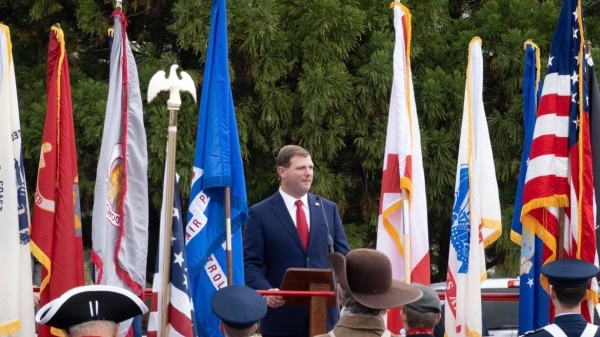The first freestanding birth centers in Alabama have been allowed to begin operations following a May 1 court ruling and months of contention regarding the regulation of midwifery during the legislative session.
The Fifteenth Judicial Circuit Court of Alabama ruled the Alabama Department of Public Health was never authorized by the legislature to regulate midwifery care in birth centers, handing responsibility for their governance to the state Board of Midwifery alongside other professional licensing boards.
The ruling came amid the failure of Senate Bill 87, sponsored by state Sen. Arthur Orr, R-Decatur, to progress past the Alabama House of Representatives.
The original version of the bill would have authorized licensed midwives to provide midwifery care in free-standing birth centers and to administer certain newborn screening tests.
SB87 initially received the support of the Alabama Midwives Alliance, who subsequently withdrew their endorsement after a substitute version offered by state Sen. Larry Stutts, R-Tuscumbia, decreased the types of postnatal tests midwives could conduct.
Stutts’ version of the bill was adopted by the Senate Healthcare Committee, after which ALMA accused the Medical Association of the State of Alabama officials of dishonestly expressing support for another sub-bill presented by Sen. Linda Coleman-Madison, D-Birmingham, that contained concessions on the part of ALMA and MASA.
The court’s decision has seen support from midwife advocacy groups and the American Civil Liberties Union, who filed the case alongside Bobby Segall of Montgomery-based law firm Copeland Franco on behalf of prospective birth centers attempting to establish locations in Alabama, The American College of Nurse Midwives, and several medical doctors and midwives working in the state.
Alabama Midwives Alliance Legislative Committee Chairperson Nancy Megginson expressed support for the court’s ruling and hope for the growth of birth centers across Alabama.
“Opening the birth centers is an excellent idea,” Megginson said. “It’s a common ground place that people can come to. They can receive prenatal care, postpartum care. They can plan a birth there.”
“There’s lots of options that birth centers are going to be able to provide, and they can meet people where they are,” she continued. “Birth centers allow for a more communication-based model of care, a heavier involvement in the pregnant person and their health in general.”
The verdict has also been celebrated by plaintiffs Oasis Family Birthing Center in Birmingham, Alabama Birth Center in Huntsville and Birth Sanctuary in Gainesville, which will now be free to operate without ADPH’s approval of their license.
Dr. Stephanie Mitchell, a certified professional midwife and certified nurse midwife originally from Boston, began operations at Birth Sanctuary Gainesville, a free-standing birth center in Sumter County, immediately following the court’s ruling.
Prior to the May ruling, an August 2023 injunction mandated ADPH must issue licenses to birth centers if they met the standards set forth by the American Association of Birth Centers, a certification Birth Center Gainesville received before the circuit court’s final ruling.
“When that ruling came down, I was like, great. I’ve already done all of this hard work, and it’s done, and our birth center is in compliance with AABC, but the health department doesn’t now need to be the one to say whether or not we operate or not,” Mitchell said. “So, it’s a big win. And we’re open accepting clients, and our first clients will be due to birth this fall.”
However, Mitchell said ensuring her birth center complied with AABC standards was only the most recent red tape she faced in order to practice midwifery in Alabama.
Upon moving to Alabama in 2020, Mitchell found that, unlike Massachusetts—where she used to work, certified nurse midwives lack both wide integration into the state’s healthcare system and the ability to practice independently.
“I moved here five years ago with zero ability to be able to work as a midwife in a freestanding birth center in the rural areas where I live,” Mitchell said. “And now, being able to have my own practice and be able to do my work is, I mean, it’s a huge win. It’s great for economic growth and stability for midwives and my family too.”
In order to practice independently in the state Mitchell had to also become registered as a certified professional midwife who, unlike CNMs, are not required to work at a practice under a physician.
“I essentially went from, you know, being in a place where I can use my career that is integrated into a healthcare system, to a place that literally doesn’t acknowledge that we’re free as a viable source of healthcare,” Mitchell said.
Mitchell argued that the previous restrictions on free standing birthing centers put undue stress on expecting mothers in rural areas who must travel long distances in order to receive comprehensive pre and post-natal care.
Mitchell cited the closure of Demopolis’s Whitfield Regional Hospital’s labor and delivery unit last year as forcing most expecting mothers in Gainesville to seek care either in Tuscaloosa or out-of-state in Meridian, Miss.
“If you know anything about, like, pre-natal care, this is not, like, a one-and-done situation,” she continued. “You need to come in once and sometimes even twice a week. And that represents a huge challenge, of course, just, like, the logistics of if people don’t have reliable transportation, and then just the other piece of it, just scheduling-wise, gas-wise, childcare-wise.”
A 2023 study from March of Dimes found that 34.3 percent of counties in Alabama qualify as maternity care deserts.
The study found that women on average must travel 17.4 miles to their nearest birthing hospital to receive care and 27.9 percent of women in the state having no birthing hospital within 30 minutes of their home.
It also found racial disparities in pre-natal care across the state, reporting that Alabamians of color and in socioeconomically vulnerable areas are 24 percent more likely than other low-income residents to have inadequate pre-natal care.
Despite the victory for her practice in court, Mitchell said she believes the state has a long way to go in improving access to quality pregnancy care.
“Quality pregnancy care is a human right. And so, there’s still huge, huge obstacles that need to be surmounted,” Mitchell said.
Mitchell described the ADPH’s regulation on birthing centers and the substitute version of SB87 proposed by Stutts as part of Alabama’s “long standing history of the criminalization of midwives.”
“Ultimately, I really feel that people do, they do want to do what’s best for moms and babies, but they’re, unable to relinquish that, sense of power or entitlement over their field,” she said.
Both Mitchell and Megginson expressed frustration that SB87, originally drafted by ALMA with Orr, was altered in a way which attempted to limit the screenings midwives can conduct.
“This process has been full of deception, secrecy, and political maneuvering at the expense of Alabama mothers and babies,” Megginson said of SB87’s progression through the legislature.
MASA told APR the association remained opposed to SB87 throughout the legislative session, saying the bill overlooked “the fundamental issues undermining maternity care in Alabama.”
“The Medical Association was one of several organizations that voiced concerns over the original bill including Blue Cross, Alabama Hospital Association and the Alabama Chapter of the American Academy of Pediatrics,” MASA Director of Communications Russell Sellers said of SB87.
Sellers cited “insufficient reimbursement, the failure to expand Medicaid and an unfavorable practice environment caused by high medical malpractice insurance rates,” as the key factors negatively impacting maternity care in the state, which MASA felt wouldn’t be improved by SB87.
Mitchell argued greater levels of collaboration between midwives and the public healthcare system would help fill gaps left by state-ran maternal healthcare services.
“If you look at our neighboring states—actually, across the United States—the threshold of beginning to improve morbidity, mortality is actually collaborative practice,” she said, “And so, that’s what I’m hoping that the state moves toward in the way of integrating midwives into the healthcare system.”
Mitchell said, however, in rural areas, like Sumter County, where coordinating travel to a hospital may make routine pre and post-natal care difficult for many women to receive, the ability of certified nurse midwives to work independently is also a necessity to improve rural maternal care.
“My next biggest fight, and I will be saving my gumption for this, but it is for the independent practice of certified nurse midwives to be on par with the certified professional midwives in the state. I mean we have no excuse for that, so that’ll be the next thing.”



















































